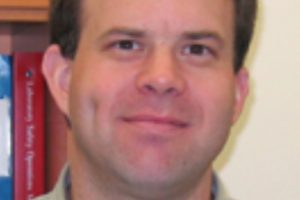
Abstract: Our lab has developed synthetic methods that allow a robust variety of modifications to the thioether containing side-chains in methionine residues. One modification is the mild oxidation of hydrophobic, alpha-helical poly(methionine) to hydrophilic, conformationally disordered poly(methionine sulfoxide). This polymer was found to possess non-fouling properties similar to PEG, but is also degradable and capable of being reduced back to methionine within cells. We report on the development of self-assembled biomaterials, such as vesicles and hydrogels, incorporating poly(methionine sulfoxide) as the solvent exposed hydrophilic segments. The use of these finely tuned hydrogel formulations for study of central nervous system biology will be presented
Bio: Timothy J. Deming received a B.S. in Chemistry from the University of California, Irvine in 1989, and graduated with a Ph.D. in Chemistry from the University of California, Berkeley, in 1993. After a NIH postdoctoral fellowship at the University of Massachusetts, Amherst with David Tirrell, he joined the faculty in the Materials Department at the University of California, Santa Barbara in 1995. Here he held appointments in the Materials and Chemistry Departments where he was promoted to Associate Professor in 1999 and Full Professor in 2003. His appointment is now as Distinguished Professor of Bioengineering and Chemistry and Biochemistry at the University of California Los Angeles. He served as the Chairman of the Bioengineering Department at UCLA from 2006 to 2011. He is a leader in the fields of polypeptide synthesis, self-assembly of block copolypeptides, and use of polypeptides in biology, for which he has received awards from the National Science Foundation, the Office of Naval Research, The Arnold and Mabel Beckman Foundation, the Alfred P. Sloan Foundation, the Camille and Henry Dreyfus Foundation, the Materials Research Society, and the IUPAC Macromolecular Division. He is also a Fellow of the American Institute of Medical and Biological Engineering, and recently received the Fulbright-Tocqueville Distinguished Chair Award. Professor Deming has a long track record of training students for performing ethical, rigorous research and for organizing their data for presentations and publications. He is active in the bioinspired materials community, currently serving as an Associate Editor for Biomacromolecules, and has been an Editorial Advisory Board member for Macromolecular Bioscience, Soft Matter, Macromolecules, and Biopolymers.
Research in the Deming lab is focused on synthesis, processing, characterization and evaluation of biomimetic materials based on polypeptides. These materials are being studied since they can be prepared from renewable resources, can be biocompatible and biodegradable, and possess unique self-assembling properties. The Deming lab develops new synthetic materials with properties that rival the complexity found in biological systems. The emphasis is on development of new synthetic methodologies as well as the use of biological precedents and strategies for the design of new materials. The Deming lab continues to take on significant new challenges in the exploration of applications of our materials for interaction with biological systems and for medicine, as well as development of new economical and scalable preparative routes to more complex and functional polypeptide architectures. Beyond UCLA, polymers developed in the Deming lab are currently being commercialized by two start-ups (Amicrobe, Inc. and Yagoda, Inc.).